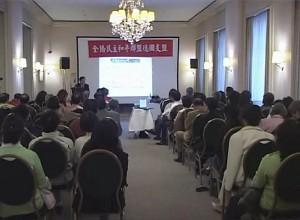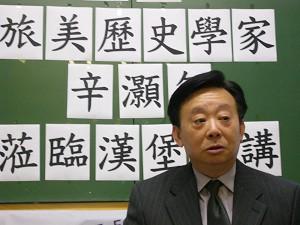FRANKFURT - By invition of the Global Alliance for Democracy and Peace German branch, Mr. Xin Haonian, Director of the Chinese Contemporary History Research Institute and Editor-in-Chief of Huanghuagang Journal, a quarterly publication on history and culture, gave public lectures in Frankfurt and Hamburg on May 25 and 27 respectively, titled “A look from an historical angle on the influence that the rising of China has on Taiwan.”
In the lecture, Xin first elaborated how the concept of “China,” as a nation, was formed in history. Then he discussed the two Chinas in modern times, namely, the Republic of China founded by Sun Zhongshan after overthrowing the Qing Dynasty in 1911, and the People’s Republic of China (PRC) founded in 1949, which used Marxism-Leninism as guiding principles. From the perspective of nationalism, the former one is considered “the China of Chinese nation,” while the latter is considered to be the first theocracy in Chinese history fostered by the former Soviet Union – the “Marxist-Leninist China.”
Using the historical experience of Britain, France, Russia and Germany, Xin told the audience that the democracy and freedom currently enjoyed in Europe was established after repeated struggles between the republican and the despotic systems and numerous predecessors’ efforts. The once-emerged republican regimes in these countries, although in a long term stage of decline under the shadow of the despotic forces’ counter attacks, were never forgotten by people. For instance, the stability of the French Republic was affected nearly one hundred years, during which time two republican regimes were overthrown by dictatorships until the establishment of the French Third Republic in 1889. For Germany, from the establishment of the first republic in 1919, the Weimar Republic, the western democracy didn’t end the despotic system in Eastern Germany until Eastern and Western Germany merged in 1990.
As to China’s growth, he pointed out that the “Rising of China” people are talking about today actually refers to the development of the “Marxist-Leninist China” over the twenty years of reform and open policy period. Recognizing the economic development brought about by the reform and open policy, he pointed out, however, that the “achievement” of corruption was even greater, as was the extreme imbalance between the rich and the poor. Moreover, compared with the economic achievement reached by the “Westernization Movement” in late-Qing Dynasty (e.g., GDP growth of 28 percent) and the political open policy during the National Republic of China (1911 – 1949) with over 1,000 private newspapers, the economic growth under the rule of the CCP can only be counted as “a small progress in a great retrogression.”

